2009 年云南昭通中考英语真题及答案
(满分 120 分,考试时间 120 分钟)
第一部分听力(共四节,满分 30 分)
第一节听句子,选出与句子内容相关的图画。(共 5 小题,每小题 1 分,满分 5 分)
1.
2.
3.
4.
5.
B. My pleasure.
B. Don't worry.
C. The same to you.
第二节听句子,选出与所听句子内容相符的正确答语。(共 5 小题,每小题 1 分,
满分 5 分)
6. A. It's interesting.
7. A. Good luck !
8. A. Certainly not.
9. A. At school.
10. A. Thanks. I will.
第三节听对话,选出能回答问题的正确选项。(共 10 小题,每小题 1 分,满分 10 分)
听第 1 段对话,回答第 11,12 小题。
11. What does Mr. Brown do?
A. A doctor.
12. What time does Mr. Brown get up in the morning?
C. It doesn't matter.
B. You're so kind.
B. I hope not.
C. No, I won't.
B. A teacher.
C. A driver.
B. On foot.
C. In ten days.
C. No, thanks.
�
C. Go to the office.
C. At Betty's house.
C. He has a stomachache.
C. No. He stays at home.
B. At 7:00.
C. At 8:00.
B. In the park.
B. Go to the concert.
A. At 6:00.
听第 2 段对话,回答第 13,14 小题。
13. What are they going to do this evening?
A. Go to the supermarket.
14. Where are they going to meet?
A. Outside the cinema.
听第 3 段对话,回答第 15―17 小题。
15. Why does Sam like Kunming?
A. Because the weather is hot and cloudy.
B. Because the weather is sunny and warm.
C. Because the weather is cold and rainy.
16. Does Sam live near the hills?
A. Yes, he does.
17. What does Sam do when the weather is bad?
A. Go climbing.
听第 4 段对话,回答第 18〜20 小题。
18. What's wrong with Nick?
A. He has a toothache.
19. Has Nick gone to see the doctor?
A. Yes, he has.
20. What does Lucy want to do?
A. She wants to clean the room for Nick.
B. She wants to help Nick with his lessons.
C. She wants to buy some fruits for Nick.
第四节听对话,完成下列信息表格。(共 5 小题,每小题 2 分,满分 10 分)
B. He has a headache.
B. Listen to music.
B. No, he doesn't.
B. No, he hasn't.
C. Watch TV.
Presents on Mother's Day
From Whom : Rose and Mike
Date: May 10th
Rose's Present: A Coat and 21.
The Color of the Coat:22.
The Size of the Coat:23.
The Money Rose Spent:24.
Mike's Present:25.
C. We don't know.
B. A hat
B. White
C. Blue
B. Size 38
C. Size 40
C. A cake
C. 400 yuan
B. 350 yuan
B. A T-shirt
C. Some flowers
21. A. A skirt
22. A. Red
23. A. Size 36
24. A. 200 yuan
25. A. A bag
第二部分英语知识运用(共三节,满分 35 分)
第一节词语释义(共 5 小题,每小题 1 分,满分 5 分)
选出与句中画线部分意义最接近的解释。
26. We often play football on weekends, but at times we go shopping.
A. always
27. My uncle rang me up this morning, but I wasn't at home.
A. visited me
C. woke me up
28. John was walking on air when he knew his father bought him a bike.
A. too bad
B. looked after me
C. very excited
B. sometimes
B. quite sad
C. as usual
D. at that time
D. called me
D. a little angry
�
hour.
, my son.
.
B. Best wishes
D. Thank you
B. a
C. an
D. /
B. that's not my favourite
D. I don't want to drink tea
B. moving, moving
D. moved, moved
29. ―Why not listen to pop music, Tom?
―Oh, that's not my cup of tea. I like classical music better.
A. it's my favourite
C. it's good for me
30. ―The dress is so beautiful. Do you like it?
―Yes. But it costs an arm and a leg and I haven't enough money with me.
B. it's very cheap
A. it's too expensive
C. it doesn't fit me
D. it's too big for me
第二节单项填空(共 20 小题,每小题 1 分,满分 20 分)
从 A、B、C、D 四个选项中选择能填入空白处的正确答案。
31. It won't be long. I'll be back in half
A. the
32. ―Happy Father's Day, dad!
―
A. I'm very happy
C. The same to you
33. After the earthquake, we heard of a lot of
deeply
A. moving, moved
C. moved, moving
34. ―What else do you want?
. I think I have got everything ready.
―
C. Something
A. Nothing
35. 一 Excuse me, when will the Flight CA980 arrive?
―Wait a minute, please. I'll
A. see
36. ―
Nanjing ! ) ?
―No, not yet. A painful memory. I will see it this weekend.
A. Will, see
37. If you don't learn something useful, you will feel sad
A. what
C. which
D. why
38. 一 Let's go out and enjoy the sunshine.
―
. It's boring to stay at home.
A. Sounds great
39. I think
A. million of
millions
40. A kind
A. eye
41. 一 The music is good, but I'm afraid it's too noisy.
down?
A. I'd love to
C. I'm glad you like it
people will go to Shanghai for the EXPO 2010.
is better than a good face.
D. I'm sorry about that
B. catch
you
C. two millions of
B. ear
C. heart D, hand
B. millions of
B. Anything
D. Everything
B. I hope so
B. Not at all
C. Forget it
D. No way
D. two
Could you please turn it
stories, and all of us were
it for you.
C. check
the film City of Life and Death ( Nanjing !
D. read
B. Are, seeing
C. Have, seen
D. Do, see
-
you are old.
B. when
�
be beautiful all the time.
D. wouldn't
D. How far
C. It's terrible
D. Be careful
her eyes, Mrs. Vera thanked the young man for saving her
B. in
C. under
D. over
B. needn't
C. How often
B. You are right
D. You are welcome
! Believe in yourself, my dear.
C. can't
is the moon away from the earth?
42. ―Shall I get some drinks for you?
A. That's nice of you
C, Here you are
43. With tears
child.
A. out
44. Just like weather, life
A. mustn't
45. ―
—It's about 383 000 kilometers.
A. How long
B. How soon
46. ―I'm worried about the test tomorrow, mum.
一
A. It's a joke
47. ―I'm leaving for Hawaii on vacation this afternoon.
―
A. Can you say it again?
C, I don't care.
48. Thought is the key
A. why
49. ―Do you know
— Yes. In May, 2009.
A. when Ben got his job
C. when did Ben get his job
50. ― Don't
―I won't, mum. Good night.
A. wake up
C. get up
第三节完形填空(共 10 小题,每小题 1 分,满分 10 分)
从 A、B、C、D 四个选项中选择能填人空白处的正确答案。
And don't forget to send me a postcard.
D. Have a nice trip !
B. Take it easy
in Australia?
B. stay up
C. which
B. where
D. who
B. Can I go with you?
opens the doors of the world.
B. when will Ben get his job
D. when Ben will get his job
too late, or you will feel tired in class.
D. stand up
A gentleman put an ad in a newspaper for a boy to work in his office. About
. Finally, the gentleman chose one after the
51
60 persons came for the
interview.
"I'd like to know," said a friend,"why you 52 that boy, who brought not a
letter―not a recommendation(推荐信)."
"You're 53
. He did not bring a single letter. " said the gentleman. "But I
think he had a great many. He wiped(擦)his feet at the door and closed the door
to that old man, showing he was
54
kind and friendly. He turned off his mobile phone 56
he came in, and answered my
questions quickly, showing that he was
him, showing he was careful. He gave his 55
and a real gentleman."
57
"He waited for his 58
instead of pushing and crowding. As I talked to him,
I 59 his clean clothing, hair and finger-nails. Can't you see that these things are
the best recommendations? I think they are
51. A. interview
52. A. know
C. meeting
C. prefer
than letters."
B. introduce
D. dislike
B. class
D. exam
60
�
B. behind
C. before
B. serious
C. wrong
B. bag
B. since
53. A. honest
54. A. in front of
55. A. seat
56. A. if
57. A. healthy
58. A. turn
59. A. watched
60. A. less important
interesting
第三部分阅读理解(共 15 小题,每小题 2 分,满分 30 分)
B. polite
B. answer
B. thought
C. mobile phone
C. until
C. happy
C. term
D. right
D. beside
D. letter
D. as soon as
D. helpful
D. result
D. liked
C. noticed
B. more important
C. less interesting
D. more
A
Top students always have special ways of learning that others probably can learn.
Here arc some of their secrets.
♦ Study any time and everywhere. Some work late at night. Others work early in the
morning. And some others study as soon as they come back home. All the ways are OK,
but you should keep your own.
♦ Learn how to read. The secret of good reading is to be an active reader. Asking
questions makes a full understanding of the book.
♦ Plan your time. If you want to be the top, make sure to finish all tasks on time.
♦ Keep your papers clean. Clean papers are likely to get higher grades than dirty
ones.
♦ Top students often make up possible test questions themselves. It helps them find
exams much easier.
♦ Do more than what your teacher asks. The more you practice, the more you learn.
根据短文内容,判断以下句子的正误。你认为正确的句子写"T",错误的写"F"。 (共 5 小题,
每小题 2 分,满分 10 分)
61. The secrets are written for successful teachers,
62. If you want to he the top, you can only work late at night.
63. To read better, try to he an active reader.
64. It's necessary to keep your papers clean to get higher grades.
65. It's enough to do what your teacher asks.
B
A blind hoy sat on the steps of a building with a hat by his feet.
He held
up a sign which said,"I am blind, please help. " There were only a few coins in the
hat.
A man was walking by. He took a few coins from his pocket and dropped them into
the hat. He then took the sign, turned it around, and wrote some words. He put the
sign back so that everyone who walked by would see the new words.
Soon the hat began to fill up. A lot more people were giving money to the blind
boy. That afternoon the man who had changed the sign came to see how things were.
The boy recognized(听出)his footsteps and asked,"Were you the one who changed my
sign this morning? What did you write?"
The man said, "I only wrote the truth. I said what you said but in a different
way."
�
.
B. walk
C. hear
D. speak
What he had written was,"Today is a beautiful day; I can not see it." Of course
both signs told people the boy was blind. But the first sign simply said the boy
was blind. The second sign told people they were so lucky that they were not blind.
Should we be surprised that the second sign was more effective(有效的)?
根据短文内容,选择正确答案。(共 5 小题,每小题 1 分,满分 10 分)
66. The boy in the passage can not
A. see
67. How did the man help the boy?
A. He gave the boy a lot of money.
B. He brought the boy back to his home.
C. He wrote some new words on the sign.
D. He sent the boy to a special school.
68. The underlined words "held up" in the first paragraph mean
A.阻碍
69. What happened after the man changed the sign?
A. The boy still got a few coins in the hat.
C. No one gave the boy Coins any more.
70. What can we learn from the story? '
A. Time means life; time is money.
B. You should be brave even though you're blind.
C. Treating a thing differently brings a different result.
D. If we want to be rich, we should be honest.
B. The boy got much more money.
D. The boy became healthy.
D.坚持
B.举着
C.承受
.
C
British teenagers cost their parents an average(平均)of £9 ,000 a year. Where
does their money come from? And what do they like to spend it on? Let's see what
the two boys said.
Emil, 15, lives with his parents, two brothers and one sister.
Income(收入):Every week I get £30 from my parents. I usually spend it going
out with my friends.
Expenditure(花费):I have two phones. My parents pay for one—it's £25 a month
一 and I pay for the other. If I need clothes, and I really need them, my mum will
give me the money. I pay £6 for my hair cut.
Tom, another boy, 17, lives with his parents. They give some extra(额外的)
money when he has used up the money he gets from a part-time job.
Income: I've got a part — time job. I do two evenings a week and on Sundays.
My monthly wage(工资)is about £220. If I have used up my wages, I ask for a bit of
money. If 1 ask my dad, he gives me the money and then I have to pay him back at
the end of the month, but my mum just gives me the money and says, " All right. Have
a good time!"
Expenditure : I usually save up my pay for the things I want. If I need a little
bit of extra money, I'll ask for it as a present. But if I want anything else that
costs more, I will spend some of my wages on it. My dad pays £25 for my monthly phone
calls, I think he pays for it because he wants me to be able to keep in touch with
them.
�
C.£100
.
B. lives in a big family
D. has two sisters and a brother
for him.
B. his haircut
根据短文内容,选择正确答案。(共 5 小题,每小题 2 分,满分 10 分)
71. How much money does Emil get from his parents each month?
A. £80. 11 £90.
D. £120.
72. From the passage, we can learn that Emil
A. is the only child in the family
C. lives with his grandparents
73. What does Tom usually do for the things he wants?
A. He saves up his pay.
B. He asks his parents for them.
C. He borrows them from his friends.
D. He borrows money from his parents.
74. Tom's father pays for
A. his clothes
C. his monthly phone calls
75. Which of the following statements is TRUE?
A. Emil himself pays for his two phones calls.
B. Emil's mother gives him the money for his haircut.
C. Tom's parents don't give him money because he has a part-lime job.
D. Tom's father wants him to pay back the money he asks for, but his mother doesn't.
第四部分写作(共三节,满分 25 分)
第一节根据句意,用括号中所给词的适当形式填空。(共 5 小题,每小题 1 分,满 分 5 分)
76. The little boy wants to be an
77. Life is like a piece of white paper, on which we may draw the
pictures, (new)
78. It is raining. You should drive the car
79. Parents are our first teachers. They teach
80. Take the time and listen, and you'll hear the
sound of nature, (wonder)
第二节将下列句子中汉语部分译成英语,注意使用适当的形式。(共 5 小题,每小 题 1 分,
满分 5 分)
81. Animals are our friends. I like to keep a
82. Don't
83. We should obey the
84. ― How often do you help your mother with the housework?
―
85. In order to save the trees on the earth, we'd better use fewer
袋)
第二节书面表达(满分 15 分)
and learn to protect ourselves.(交通规则)
! Your dream will come true (放弃)
. (care)
lessons of life, (we)
when he grows up. (act)
and finest
in my house.(宠物狗)
D. his presents
.(一周一次)
,(纸
Sunshine in My Life
提示:生活中处处充满着阳光。每个人都会得到同学的帮助,朋友的支持,老师 的关心,
亲人的爱护,让你感受到生活中的阳光和幸福。请写一件你经历过的事,说 明生活是美好
的。
要求:1.请根据所给的题目,用英语写一篇短文,词数不少于 60 个;
2. 语言流畅、书写规范、卷面整洁;
3. 文中不得使用你的真实姓名、校名,否则以零分计;
�
3.C
24. B
25. C
参考答案
7. C
16. A
6. A
15. B
13. B
14. C
4. A
5.C
22. A
23. B
20. B
21.
8. A
17. C
2. A
12. A
9. B
10. A
18. B 19. A
1. B
11. C
C
26. B【解析】词组 at times 意为"有时",频率副词 sometimes 也意为"有时",故选 B。
27. D【解析】短语 ring sb. up 意为"给某人打电话",相当于 call sb.,故选 D。
28. C【解析】短语 walk on air 意为"洋洋得意",very excited 意为"非常兴奋",两者比
较相近,故选 c。
29. B【解析】根据后句的句意"我比较喜欢古典音乐",所以 前句应该翻译成"那不是我最
喜欢的",故选 B。
30. A【解析】cost an arm and a leg 意为"非常贵",正和 A 项 的句意相符,故选 A。
31. C【解析】本题考査冠词的用法。名词 hour 的音标是以 元音因素幵始,故应该用不定
冠词 an。
32. D【解析】本题考查情景交际。在父亲节时,儿子对父亲 说"父亲节快乐",父亲应该对
儿子说"谢谢!",故选 D。
33. A【解析】本题考査形容词 moving 和 moved 的区别。形 容词 moving 意为"令人感动的",
主语通常是物;形容词 moved 意为"感动的",主语通常是人,故选 A。
34. A【解析】本题考查不定代词用法。根据句意"我想我已 经准备好一切",故不需要什么
东西了,不定代词 nothing, 表示否定,故选 A。
35. C【解析】本题考查情景交际。根据句意"请稍等,我将 为你查查",动词 check 意为"
检查",故选 C。
36. C【解析】本题考查时态用法。在现在完成时的句子中, already 常用于肯定句,yet
常用于否定句和疑问句,故 选 0。
37. B【解析】本题考查疑问副词的用法。疑问副词 when 引 导时间状语从句,意为"当……
的时候",故选 B。
38. A【解析】本题考査情景交际。因为待在家里乏味,出去 晒晒太阳应该是听起来很棒,
故选 A。
39. B【解析】本题考查数词的用法。基数词在表示确切的数 字时,不能使用百、千、百万、
十亿的复数形式,而是直接用 在数量的后面,如 3 hundred, 5 thousand, 7 million, 9
billion;当基数词表示不确切数字,如成百、成千上万,三 三两两时,基数词则以复数形
式出现,如:hundreds of , thousands of, millions of 意思是:数以百计的,成千上
万 的,上百万的。故选 B。
40. C【解析】本题考查名词词义辨析。根据常理,善良的心 要比好看的脸更好,故选 C。
41. D【解析】本题考査情景交际。由于自己开得音乐声音 很大,别人感觉喧闹,故应该跟
人家说声对不起,故选 D。
42. A【解析】本题考查情景交际。别人为你取饮料,你应该 对人家说声谢谢,故选 A。
43. B【解析】本题考査介词的用法。with tears in one's eyes 意为"某人眼里含着泪",
故选 B。
44. C【解析】本题考査情态动词的用法。mustn't"禁止"; needn't "没必要";can't "
不可能";wouldn't "不可能"含 个人意愿。故选 c。
45. D【解析】本题考査 how long/soon/often/far 的区别。因 为答语回答的是距离,提问
距离应该用 how far,故选 D。
46. B【解析】本题考査情景交际。由于儿子担心明天的考 试,所以母亲安慰儿子不要紧张,
短语 take it easy 意为 "不紧张",故选 B。
�
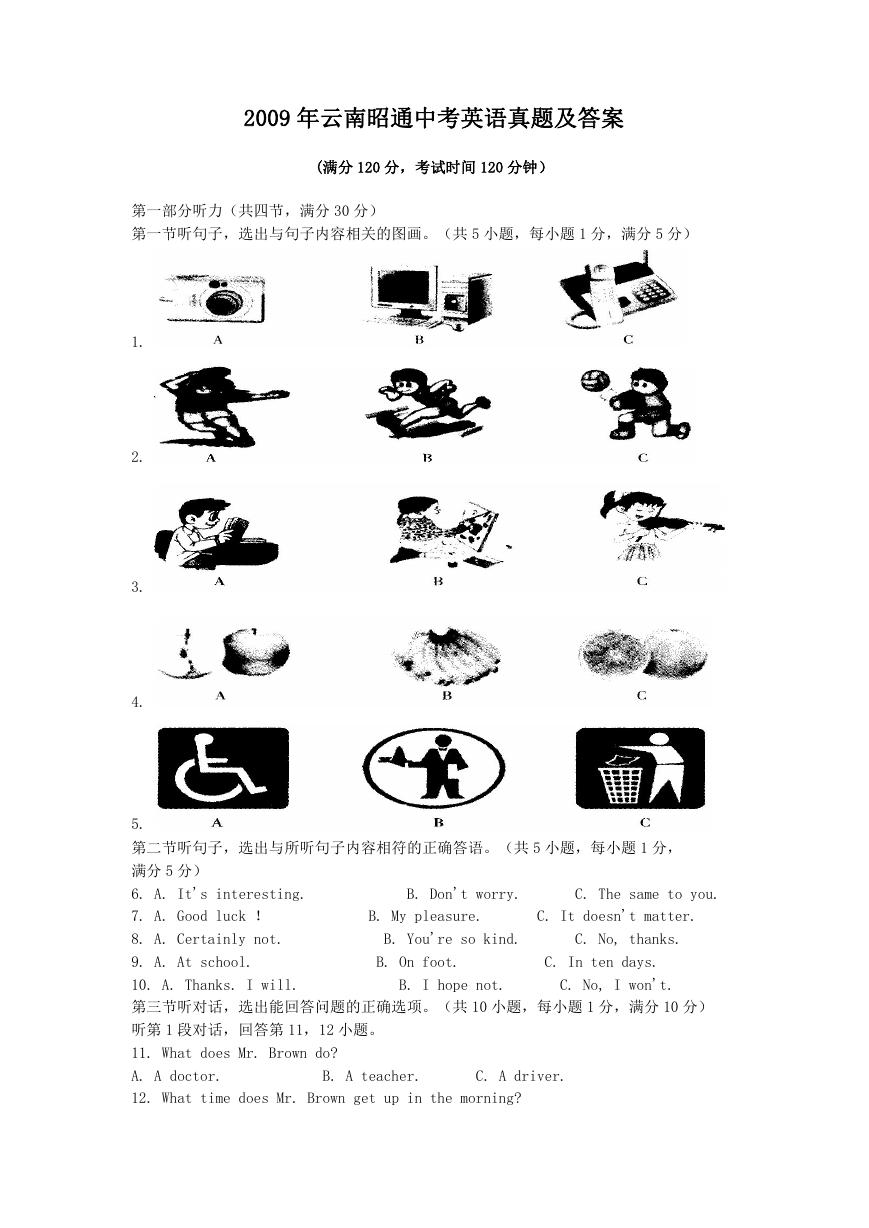
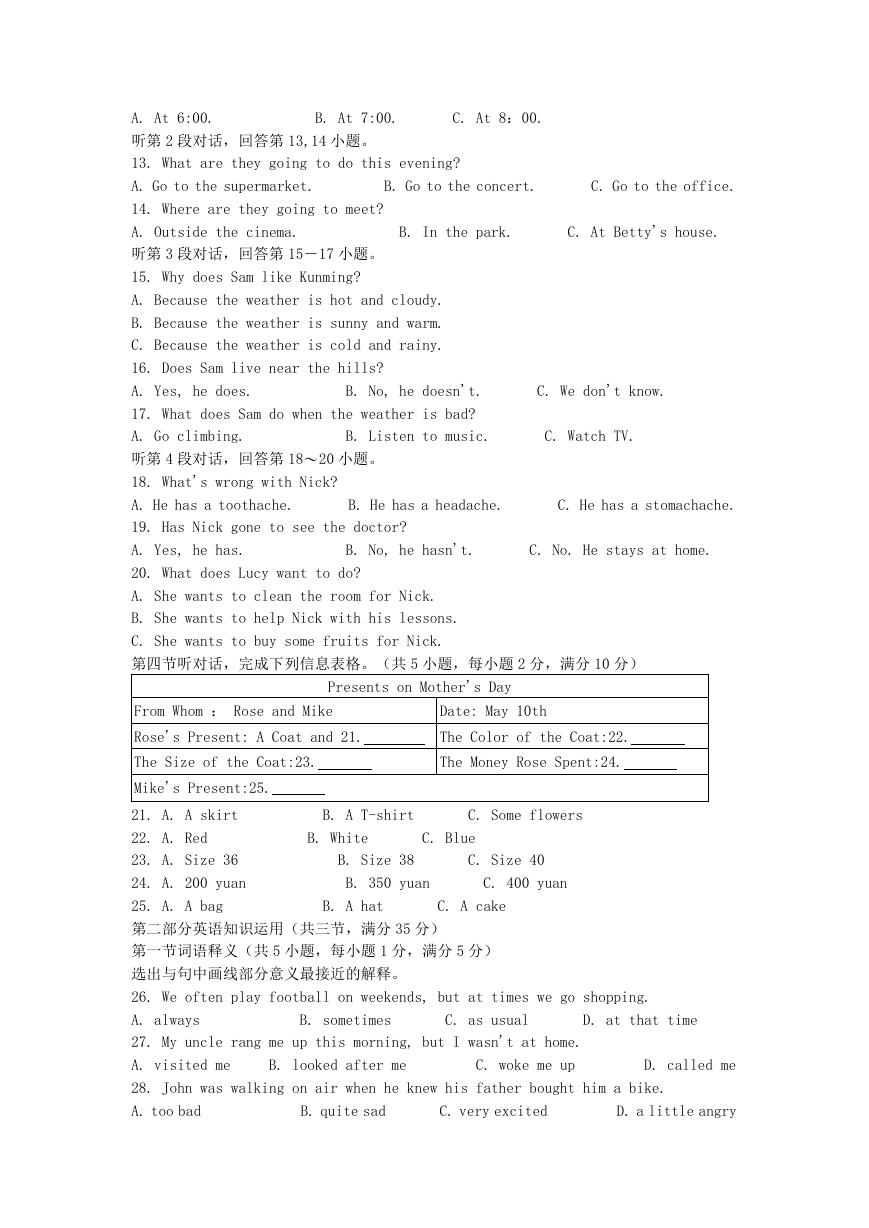
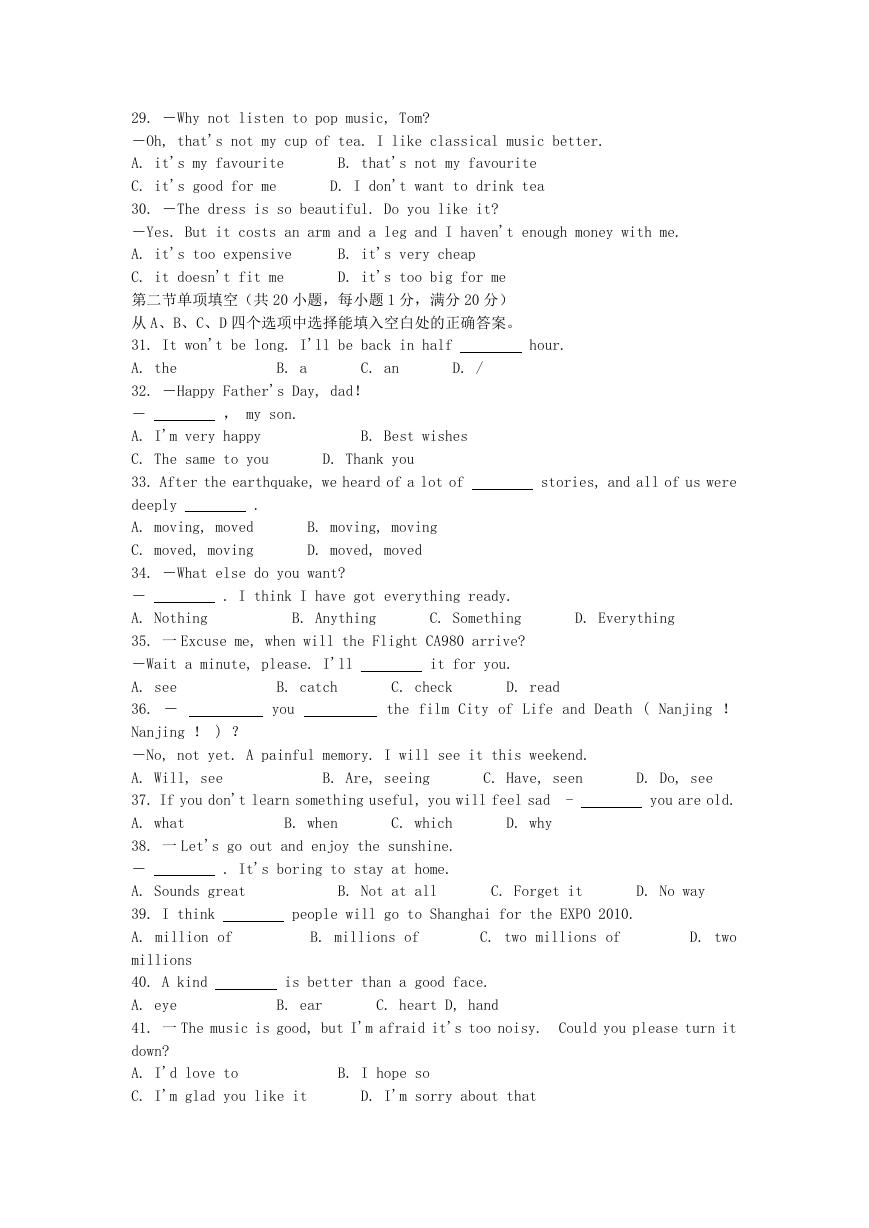
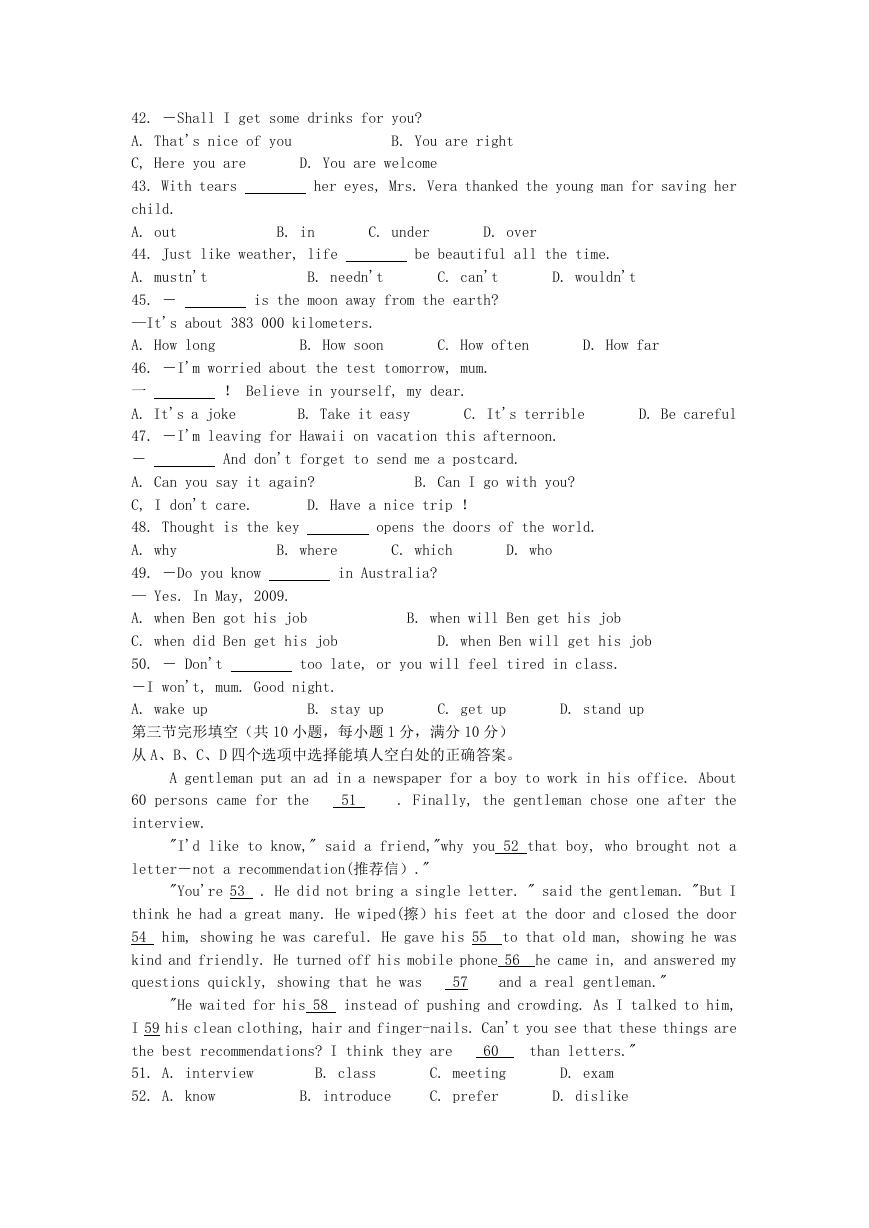
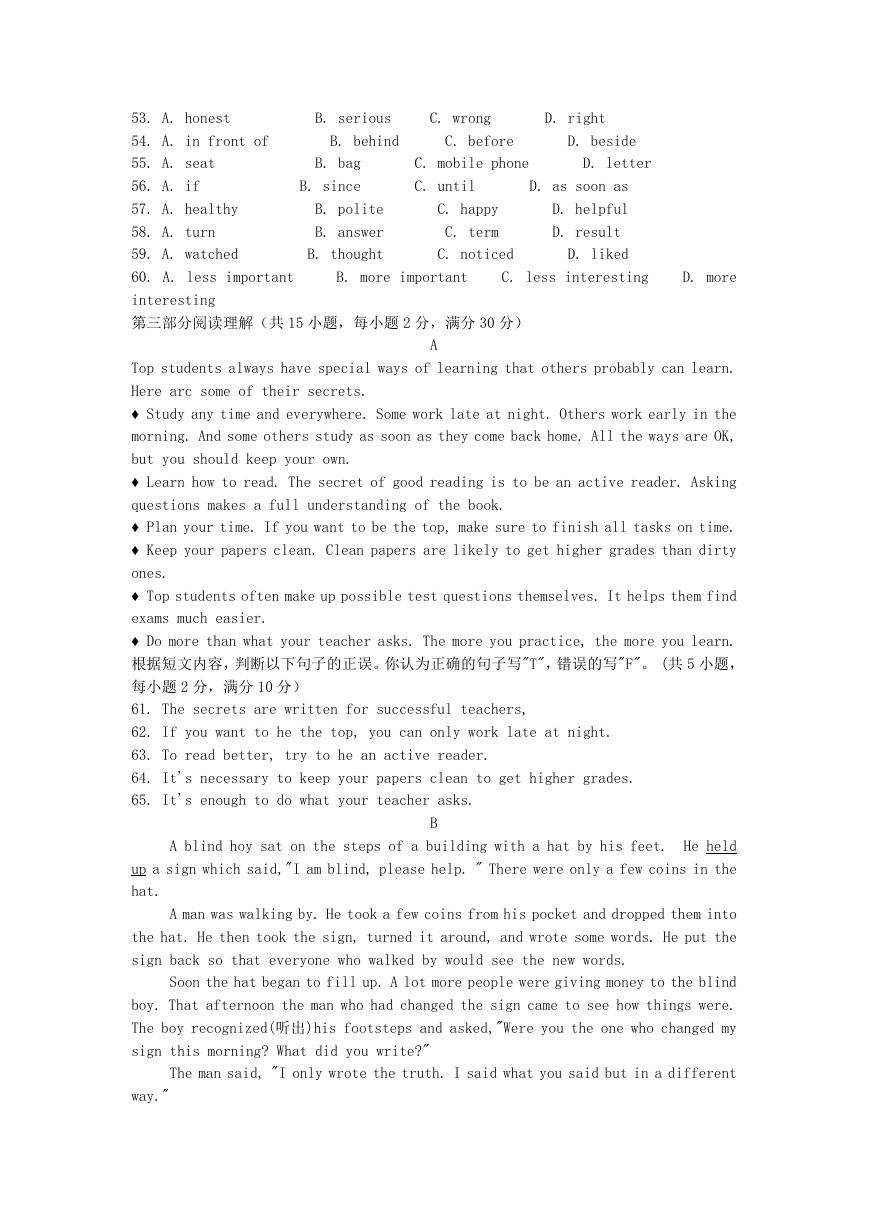

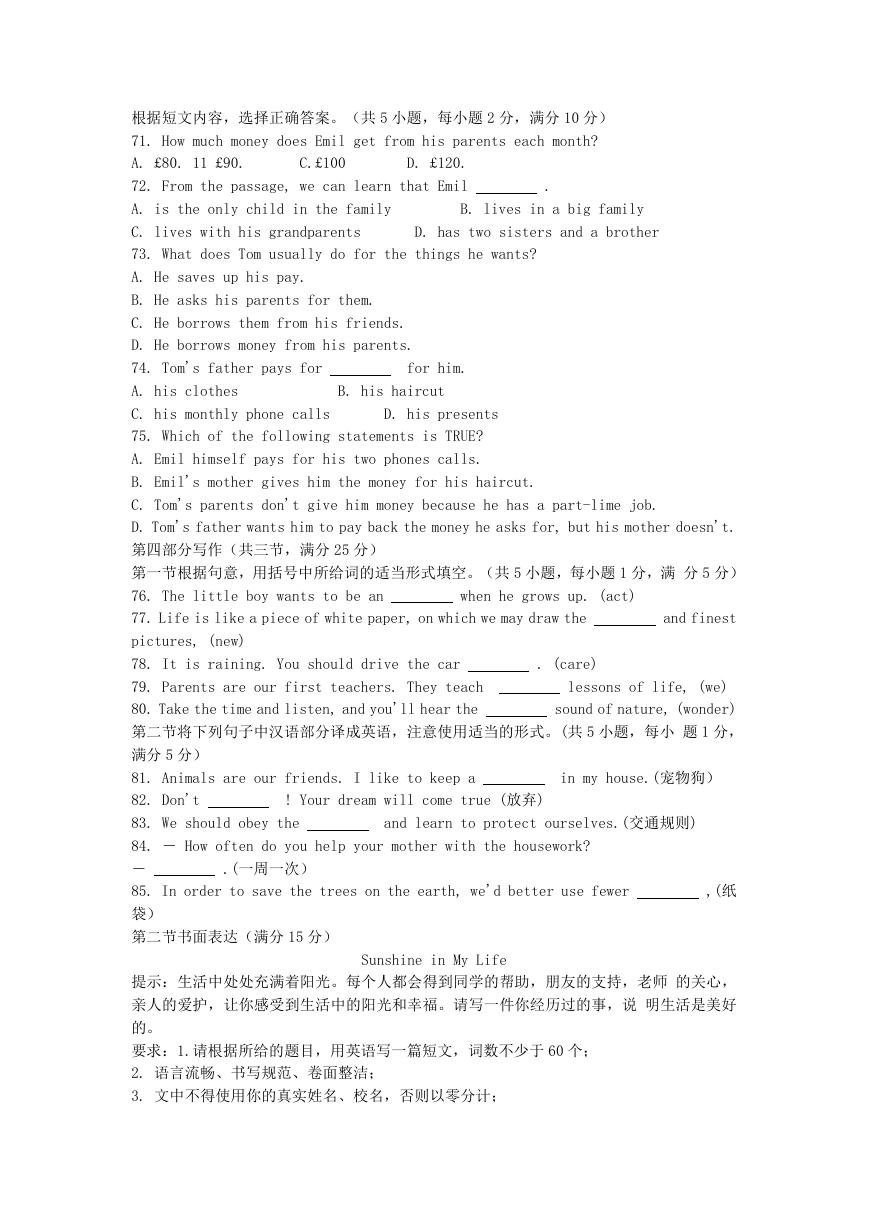
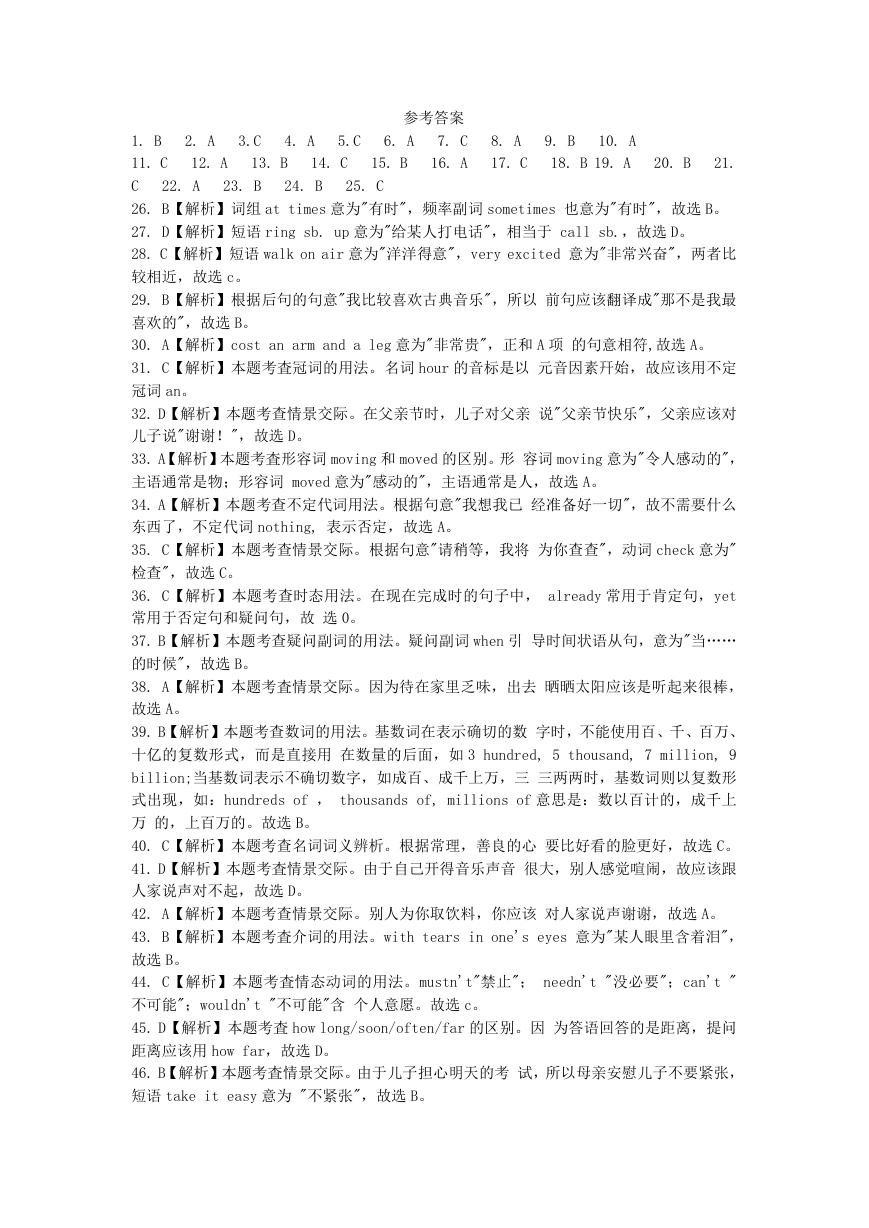








 2023年江西萍乡中考道德与法治真题及答案.doc
2023年江西萍乡中考道德与法治真题及答案.doc 2012年重庆南川中考生物真题及答案.doc
2012年重庆南川中考生物真题及答案.doc 2013年江西师范大学地理学综合及文艺理论基础考研真题.doc
2013年江西师范大学地理学综合及文艺理论基础考研真题.doc 2020年四川甘孜小升初语文真题及答案I卷.doc
2020年四川甘孜小升初语文真题及答案I卷.doc 2020年注册岩土工程师专业基础考试真题及答案.doc
2020年注册岩土工程师专业基础考试真题及答案.doc 2023-2024学年福建省厦门市九年级上学期数学月考试题及答案.doc
2023-2024学年福建省厦门市九年级上学期数学月考试题及答案.doc 2021-2022学年辽宁省沈阳市大东区九年级上学期语文期末试题及答案.doc
2021-2022学年辽宁省沈阳市大东区九年级上学期语文期末试题及答案.doc 2022-2023学年北京东城区初三第一学期物理期末试卷及答案.doc
2022-2023学年北京东城区初三第一学期物理期末试卷及答案.doc 2018上半年江西教师资格初中地理学科知识与教学能力真题及答案.doc
2018上半年江西教师资格初中地理学科知识与教学能力真题及答案.doc 2012年河北国家公务员申论考试真题及答案-省级.doc
2012年河北国家公务员申论考试真题及答案-省级.doc 2020-2021学年江苏省扬州市江都区邵樊片九年级上学期数学第一次质量检测试题及答案.doc
2020-2021学年江苏省扬州市江都区邵樊片九年级上学期数学第一次质量检测试题及答案.doc 2022下半年黑龙江教师资格证中学综合素质真题及答案.doc
2022下半年黑龙江教师资格证中学综合素质真题及答案.doc